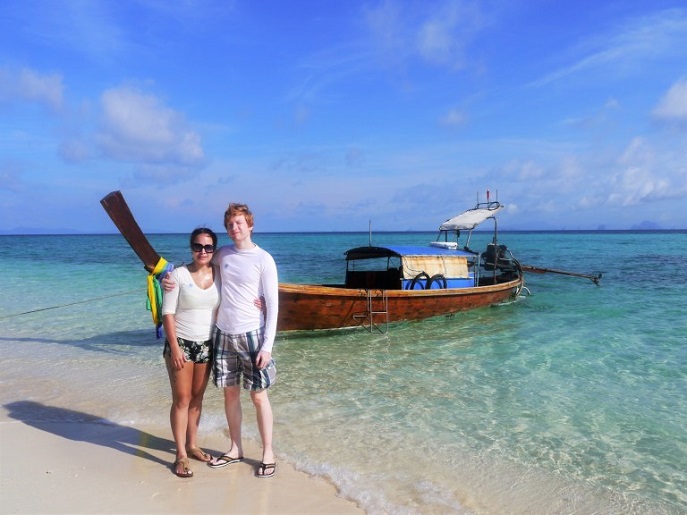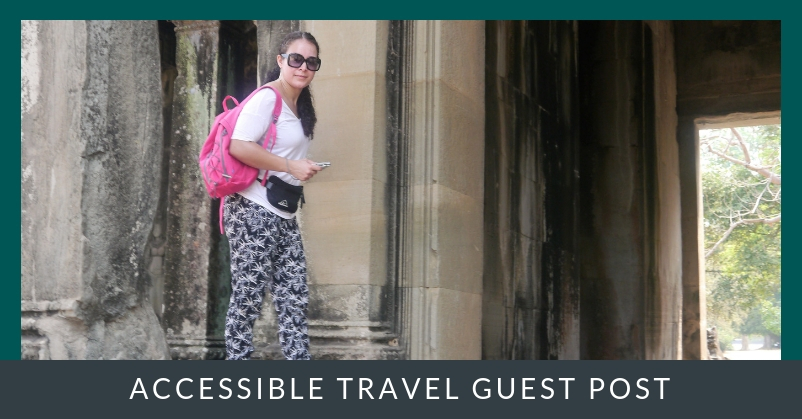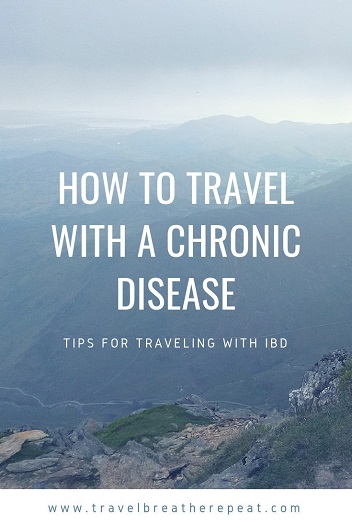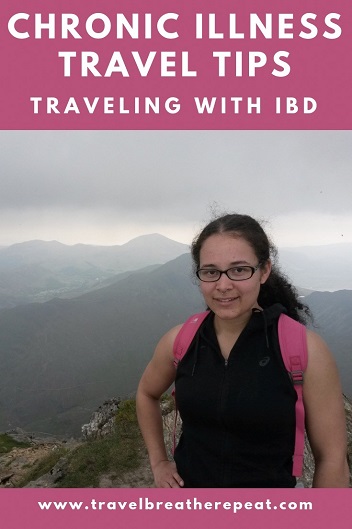Last Updated on 2nd January 2019 by Sarah and Justin
We’re pleased to introduce another traveler as part of our accessible travel series of guest posts. Rio has a chronic disease called ulcerative colitis (UC). Along with Crohn’s disease, ulcerative colitis is an inflammatory bowel disease (IBD). IBD and other gastrointestinal diseases can be quite debilitating, and as in Rio’s case, can sometimes be life-threatening. Common things associated with traveling (like changes to activity levels and diet) can excacerbate one’s condition. But like many of us, Rio loves to travel. So she’s found ways to manage her condition while exploring the world and is sharing her tips for traveling with ulcerative colitis or other chronic digestive diseases to help others get out there too.
Rio’s story and tips for travelling with a bowel condition

If you’d told me ten years ago I’d be running a travel blog I would have laughed at you. Travelling back then was nothing more than a dream. You see at the time I was diagnosed with a bowel condition, ulcerative colitis (UC), and very quickly needed surgery. For those who have never heard of UC before, it’s a disease where the colon becomes inflamed. Symptoms include diarrhoea, passing blood, abdominal pain, fatigue, mouth ulcers and joint pains. In its mildest form it can be controlled with steroids and other medications. However, as I had a severe flare, surgery was the only option.
At 20 years old it was a shock to go from being a regular university student to having major surgery to remove my colon. Not only that but I needed to have a temporary stoma. This is where a part of your small bowel is pulled out onto your abdomen where a bag is attached to collect waste. Surprisingly I took to the stoma quite well after being ill for so long, but it came with its own set of problems. Some people view stomas as for “old people”, myself included at one point. So going through this surgery as a young woman definitely knocked my body confidence and self-esteem.
My first trip after having surgery was four months later on a family holiday to Orlando. I was nervous about airport security, how my bag would cope on the plane and how I’d manage in the Floridian heat and humidity. Thankfully my concerns were not realised as everything was much easier than expected. Going on that trip so early into my recovery definitely gave me the confidence to travel more with my bowel condition.
Whilst I no longer have a stoma, I still have issues with my bowels which means I have to plan my trips with that in mind. I suffer from regular bouts of diarrhoea so I need to go to the toilet more than a regular person does. Lethargy and fatigue can also be an issue at times. It means any site-seeing activities are planned during the times of day when I’m most alert. Certain foods can be problematic although as a big foodie I tend to ignore these and eat whatever I like and suffer the consequences.
Over the past ten years I’ve travelled to more countries than I can count including Spain, Italy, Thailand, Cambodia, Jamaica, Mexico and many more. Some of these were solo trips, some with friends or family and more recently a lot have been with my partner. Since I’ve travelled extensively with UC, I’ve figured out some tips along the way. Here are my top tips on travelling with a bowel condition.
Accessible toilets
People with bowel conditions can sometimes obsess over toilets, ranging from planning where the nearest ones are to ensuring they’ve always got an aisle seat. Personally I don’t go into this much level of detail anymore as I know I’m fine for several hours. However, if you need an aisle seat then most airlines and theatres etc. offer seat selection. Likewise most attractions that serve food will have toilet facilities. Some are better than others though so keeping some tissues or wet wipes handy is useful. The last thing you need is to get caught out when there’s no tissues left (trust me I’ve been there and it wasn’t pretty)! There are various “can’t wait” or restroom request cards which can be helpful at explaining to businesses that you need urgent restroom facilities.
The majority of hotels and motels have en-suite bathrooms. But if you’re in an Airbnb, tent or other accommodation where you’ll be sharing bathroom facilities that may pose an issue. Most Airbnbs I’ve stayed in have had the bathroom just down the hall. Camp sites will have a restroom block, just make sure you’re prepared if you have to go in the middle of the night. A head torch may be a wise investment so that you’re not caught short.
Flying with a bowel condition
The change in air pressure can affect everyone but especially affects those with bowel conditions. You may get colicky type pains from this so have pain killers or your regular medication on hand. Avoiding fizzy drinks and eating a low fibre meal before and during the flight may be helpful. I try to avoid plane food in general and will have plenty of snacks to eat instead. Most planes only have a small number of toilets so you might want to select a seat that’s close by (or an aisle seat for easy access).
Not everyone is comfortable in doing this but you can inform the airline or cabin crew of your condition. Many UK airports now operate a Hidden Disabilities scheme. This allows those with a hidden disability to wear a lanyard and be easily identified by airport staff. Whilst it doesn’t tell them your particular needs, it does allow staff to give you extra time and support should you need it. We used this scheme recently when travelling through Manchester airport and it allowed me to go through fast track security. It meant that I wasn’t standing in line for longer than necessary especially as my bowels can play havoc when I’m under stress. Other international airports may have similar schemes so enquire before your flight.
Food and drink
Depending on your travel destination you’ll want to follow some food and drink safety precautions. Traveller’s diarrhoea isn’t fun for anyone and certainly not someone who is already at risk of dehydration. Ensure you drink plenty of water at all times. If you follow basic food and drink hygiene then you’ll generally be okay. Drink bottled or filtered water, do not have drinks with ice cubes and watch out for salad that may have been washed in regular water.
Follow your senses. If a restaurant or food stall looks dodgy then chances are it is. The last thing you need on your trip is to get sick. When we visited Thailand last year we ate a dodgy food stall where we both got sick afterwards. The flight home two days later wasn’t pleasant when we were both ill. To keep dehydration at bay you can carry some rehydration sachets.
Emergency travel kit
Before going on any trip I like to keep a folder of everything medical I might need whilst away. This includes a letter from my GP or surgeon, travel insurance documentation and a travel certificate. The travel certificate is basically a fold out leaflet explaining the nature of my surgery which is written in 8 different languages (in the UK these can be obtained through IA). It’s useful if I ever have to explain my condition abroad, although this has never happened yet. I’ll also carry any medications, wet wipes, hand sanitizer, a change of underwear and rehydration sachets with me. These all go into my carry-on luggage. If you have a stoma then your regular supplies would also need to go into your carry-on.
Why I love travel

Travel has given me a chance to break out of my comfort zone and experience things that I couldn’t have dreamed of. From that scared 20 year old who was going through surgery to the strong, cultured woman that I am today. Travelling ultimately saved my life as before discovering my love for it I didn’t think I had anything to live for. It’s one of the main motivations for starting a blog so that I can share my passion and experiences with the world. I’m grateful for every experience I’ve had so far and that I have a wonderful partner who I can share it all with.
About Rio

Rio is a writer, blogger and self-confessed travel junkie who lives in the UK with her partner Law. Together they run the travel and relationship blog, Opposite Tourists, where they aim is to show the good, the bad and the ugly of travelling as a couple. Whilst “opposites” they somehow make it work and blog about their successes of not wanting to pull each other’s hair out! She likes travel (of course), pole dancing, reading and rock climbing.
You can also follow Rio and Law on Instagram, Twitter, Facebook, and Pinterest.




You are such an inspiring person. Thank you for sharing your story 🙂
We were inspired by Rio’s story as well!
How awesome. This is a fantastic post which again proves what amazing things people can do despite potential obstacles. Go you!! Some of this resonated with me as an IBS sufferer who loves to travel- there are many funny stories but the travel makes it so worth it.
Thank you for the positive feedback!
Awesome post!
I didn’t know about the invisible disabilities scheme. My sister has a stoma (so does one of my best friends…it actually seems pretty common) So i’ll let them know about it.
We didn’t know about it either… it seems like a great idea!
My teenage child also has UC and while it put a stop to our plans for long-term travel (he gets monthly IV treatments), we still enjoy travel as well. Great post!
Awesome that you found a way to still fit travel into your lives even with your son’s condition.
I have IBS, it’s not the same, but I still get debilitating stomach pain, diarrhea, severe bloating, and constipation. Travelling is my enemy, but I absolutely love it, so I just make sure I’m prepared!
Traveling with any medical issue can complicate things! We’re glad you’ve found ways to manage your condition and enjoy seeing the world 🙂